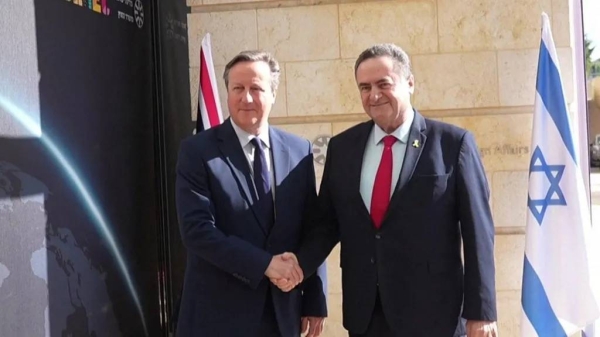David Cameron urges Benjamin Netanyahu to limit Iran’s response
While in Jerusalem, David Cameron advised Israeli leaders to minimize actions that could exacerbate tensions in the Middle East. The UK foreign secretary met with Israeli Prime Minister Benjamin Netanyahu during his visit.
Following Iran’s unprecedented missile and drone attack over the weekend, Israel has pledged to retaliate.
Expressing concerns about the potential for a broader regional conflict, Lord Cameron urged Israel to exercise restraint in its response. He emphasized the importance of Israel’s response being both prudent and firm.
Upon his arrival in Jerusalem, Lord Cameron stated his purpose was to demonstrate solidarity in the aftermath of Iran’s attack. He stressed the need for Israel to respond in a manner that minimizes escalation and strategically addresses the situation.
Lord Cameron, along with other Western foreign ministers, is scheduled to visit Israel to convey this message directly. Before meeting with Prime Minister Netanyahu, Lord Cameron held discussions with Israeli President Isaac Herzog and Foreign Affairs Minister Israel Katz.
In addition to his meetings in Israel, the UK foreign secretary plans to visit the Occupied Palestinian Territories to meet with Palestinian Authority Prime Minister Mohammad Mustafa.
Following his visit to the region, Lord Cameron will attend a gathering of G7 ministers in Italy, where he intends to advocate for coordinated sanctions against Iran. He accused Tehran of engaging in destabilizing activities in the Middle East and called for unified action among G7 countries.
Both the US and European Union are contemplating further sanctions, while Israel is urging its allies to designate the Islamic Revolutionary Guard Corps (IRGC) as a terrorist organization.
The Israeli government’s vow to retaliate comes after Iran launched over 300 drones and missiles toward Israel in a direct attack, which was mostly intercepted by Israel’s air defense systems with assistance from the UK, US, France, and Jordan.
Iran’s attack was purportedly in response to a strike in Syria on April 1, which reportedly killed senior Iranian military figures. Although Israel has not publicly acknowledged responsibility for the attack, it is widely believed to be the perpetrator.
UK Prime Minister Rishi Sunak recently spoke with Mr. Netanyahu, cautioning against significant escalation that could further destabilize the region.
Lord Cameron aims to reinforce this message during his visit to Israel, while also urging Israeli leaders to facilitate humanitarian aid to Gaza. However, he must navigate this diplomatic challenge with care.
The foreign secretary will not want to appear to be hectoring an ally that has just been subject to an unprecedented attack on its soil.
That is why Lord Cameron is also talking about the need for Hamas to release hostages and the importance of Western powers imposing yet more sanctions on Iran.
His presence in Jerusalem is a show of support and solidarity – but also an attempt to warn Israeli leaders that any significant escalation would be against their interests and the world’s.


